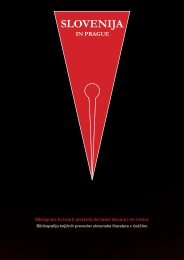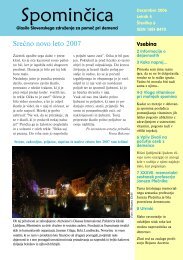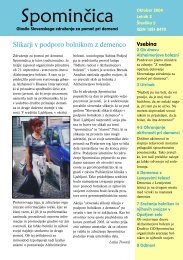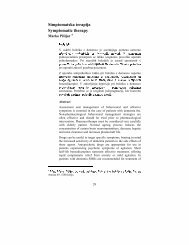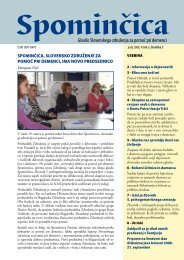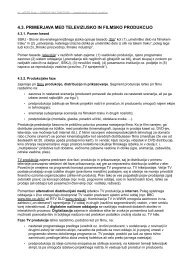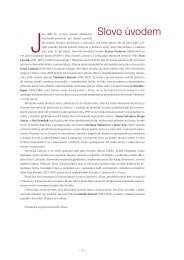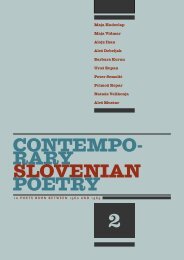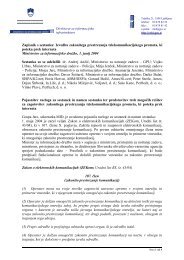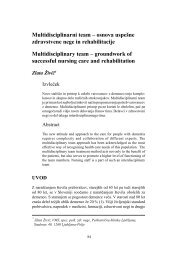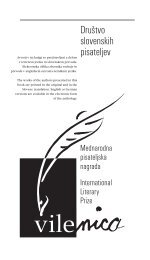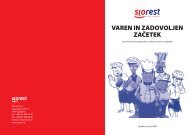Contempo- rary Slovenian poetry 1 - Ljudmila
Contempo- rary Slovenian poetry 1 - Ljudmila
Contempo- rary Slovenian poetry 1 - Ljudmila
Create successful ePaper yourself
Turn your PDF publications into a flip-book with our unique Google optimized e-Paper software.
<strong>Contempo</strong><strong>rary</strong><br />
<strong>Slovenian</strong><br />
<strong>poetry</strong><br />
10 poets born before 1960<br />
Kajetan Kovič<br />
veno taufer<br />
Svetlana makarovič<br />
niko Grafenauer<br />
tomaž Šalamun<br />
milan Dekleva<br />
milan Jesih<br />
Boris a. novak<br />
tone Škrjanec<br />
Brane mozetič<br />
1<br />
1
2<br />
Photo by Igor Modic<br />
KaJetan<br />
Kovič<br />
books in translation<br />
novels<br />
Ni bog ni životinja, Zagreb:<br />
Zora, 1967<br />
Kapote sti Liumpliana,<br />
Athens: Alvin Redman<br />
Hellas, 1970<br />
Sem isten, sem állat,<br />
Budapest: Európa<br />
könivkyado, 1972<br />
Verseny, Budapest: Európa<br />
könivkyadó, 1975<br />
Ani buh ani zvíře, Prague:<br />
Melantrich, 1980<br />
Put u Trento, Zagreb:<br />
Znanje, 1997<br />
Utazás Trentóba, Budapest:<br />
Európa könivkyadó, 1998<br />
Professor der Phantasie,<br />
Klagenfurt/Wien:<br />
Hermagoras, 1998<br />
Il professore di<br />
immaginazione, Milano:<br />
Hefti, 2000<br />
Le professeur des rêves,<br />
Charlieu: La Bartavelle<br />
Éditeur, 2000<br />
Kajetan Kovič (b. 1931) is a member of the generation<br />
which, by bringing out the prominent collection of<br />
verse Pesmi štirih (Four Poets, 1953), broke with the<br />
required politically correct <strong>poetry</strong> of social realism.<br />
Images of the class struggle and working victories were<br />
replaced by <strong>poetry</strong> initially oriented to intimacy, stories<br />
of interpersonal proximity and distance. Kovič’s further<br />
development led to philosophical lyric <strong>poetry</strong>, disciplined<br />
in imagery and classical in form, whose central motif<br />
is often the image of a cold, distant landscape, as<br />
heralded in the titles of the collections Labrador (1976)<br />
and Sibirski ciklus (Siberian Cycle, 1992). His influences<br />
clearly include the <strong>poetry</strong> Kovič selected to translate into<br />
<strong>Slovenian</strong>, mostly from German (Trakl, Rilke). Kovič<br />
is the author of several novels; his first works of fiction<br />
from the 1960s deal with the sense of barrenness in the<br />
contempo<strong>rary</strong> world, while his novel Pot v Trento (Track<br />
to Trento, 1994) turns to history, more particularly to<br />
the time of the Isonzo Front during WW 1. Rounding off<br />
Kovič’s artistic output are his prose and <strong>poetry</strong> works for<br />
children, including the story of the lovable teddy-bear<br />
Moj prijatelj Piki Jakob (My Friend Piki Jakob) which is<br />
an all-time favourite with <strong>Slovenian</strong> children and a bestseller<br />
translated into several languages.<br />
<strong>poetry</strong><br />
Čas savesti, Beograd:<br />
Prosveta, 1965<br />
Goldene Schiffe, Plochingen<br />
am Neckar: Richard<br />
Schorndorfer, 1969<br />
Korene vetra, Bratislava:<br />
Slovensky spisovatel’,<br />
1970<br />
Pesme, Beograd: Narodna<br />
knjiga, 1974<br />
Versei, Budapest: Európa<br />
könyvkiadó, 1979<br />
Holunderstunden, Graz:<br />
Verlag Styria, 1983<br />
Sibirischer Zyklus, Graz:<br />
Werkgruppe Lyrik, 1994<br />
Le ore di sambuco, Pasian di<br />
Prato: Campanotto, 1999<br />
Sommer, Klagenfurt/ Wien:<br />
Wieser Verlag, 1999<br />
Bodzaórák, Pécs: Jelenkor<br />
Kiado, 2002<br />
Dalečini, Sofia: Poesie,<br />
2002
Translated by Erica Johnson<br />
Debeljak<br />
Translated by Herbert<br />
Kuhner<br />
Translated by Tom Ložar<br />
White Fairy Tale<br />
Across the world footprints go,<br />
across the world tracks through snow.<br />
God knows who came before me,<br />
god knows who after me will go.<br />
All the paths are ever old,<br />
all of them lead to death,<br />
for all begins with birth,<br />
and each step is ever new.<br />
Across the world footprints go,<br />
across the world tracks through snow.<br />
One of them belongs to me,<br />
and on it falling, falling snow.<br />
Alone<br />
I close the doors behind me,<br />
I close the doors<br />
behind the moon, the stars, the flowers,<br />
I close the doors behind the birds,<br />
the doors behind gardens<br />
as alone...<br />
as bitterness<br />
my sadness blooms,<br />
as alone as the sea<br />
I call the cranes of sadness,<br />
as alone as the wind<br />
I sing the psalms of death, of love,<br />
I close the doors,<br />
I close the doors with brittle lips,<br />
with hands pierced to the depths of my soul.<br />
Elderberry Hours<br />
This is the old elderberry behind the house. These,<br />
the elderberry hours.<br />
The terrifyingly green tightness of the leaves.<br />
The blackish tint of the berries.<br />
The bitter elderberry time before the storm.<br />
Below the wall, the blossoms of the nettle.<br />
The grass unmown.<br />
Behind the wall, a room.<br />
The stale smell of bachelor uncles.<br />
The hollow elderberry stalk of Sunday.<br />
The after-dinner quiet.<br />
The reddish stems of the berries.<br />
Their flat, insipid taste<br />
in elderberry sleep.<br />
Sweet spittle ripens<br />
in the sluggish mouth of boys<br />
leaning on the elderberry flanks of houses.<br />
3
4<br />
Translated by Tom Ložar<br />
Translated by Alistair<br />
MacKinnon<br />
Translated by Alistair<br />
MacKinnon<br />
Garden of Gold<br />
The chill and the damp under the pine tree.<br />
The long shadow over the dark house.<br />
Grapes, blue as dreams.<br />
In curtained rooms,<br />
dying fathers,<br />
whose punishment is sons<br />
left behind in wars,<br />
entranced by the cuckoos’ singing.<br />
In the garden, the yellow autumn hour,<br />
and under sweaters,<br />
the warm breasts of girls,<br />
as they lie down horizontal<br />
under the curiosity of boys,<br />
and as above them, blue as death,<br />
ripens the isabella.<br />
Labrador<br />
White the roar of rivers deep<br />
in the dark plains of Labrador.<br />
Distant is the misty shore.<br />
Between are hills. Between are seas.<br />
There is a lonely wood of pines.<br />
There is the boundless breath of space.<br />
There is the resin-scented bark.<br />
There are red and luscious grape.<br />
Here is the light of cypress green<br />
clear to the horizon far.<br />
There are fires of southern stars.<br />
And there are hills. And there are seas.<br />
The Hunter<br />
In the dark of evening they bend their bows.<br />
Heavy hands grasp and take aim.<br />
Cries break from the maddened mouths.<br />
World-wide tremble the timid game.<br />
On the mountain a rustle of trees.<br />
In the wood the hunter is touched with fear.<br />
Music is heard from a dance afar.<br />
A stone sinks deep in the waters dark.<br />
The quarry is struck by the hunter’s dart.<br />
In the dusk the mild eyes glaze in the wood.<br />
The hours go by. The years go by.<br />
The hunter is handsome from new-shed blood.
Translated by Erica Johnson<br />
Debeljak<br />
Translated by Tom Ložar<br />
A Southern Island<br />
It is a southern island. It is.<br />
Distant in an unknown sea,<br />
it is a speck on the horizon.<br />
It is a streak from the mist.<br />
Between daybreak and darkness,<br />
from white water it emerges<br />
and timelessly endures.<br />
And suddenly sinks to the bottom.<br />
And the sea is heavy and drunk<br />
from its sweetness.<br />
And salt closes the wound.<br />
And hints that it is no more.<br />
That at the dark bottom<br />
there are only shards of shells,<br />
the branches of a bitter olive tree<br />
and the wavering of moss.<br />
But the water opens<br />
and a strong star rises<br />
and a new boat sails<br />
and a southern island is.<br />
The Water of Life<br />
comes and knocks<br />
softly at first like rain in the early morning<br />
on the windows of diners<br />
where workmen drink their hurried teas<br />
comes from the lukewarm air<br />
from the glass autumn<br />
tasting of the mountain in blossom<br />
and the thrill wolves feel<br />
and just touches hands and feet<br />
and skin the whole body over<br />
comes with the vertigo of windmills<br />
screws<br />
and strong machines<br />
into the mad<br />
dynamic day<br />
into the white heart of the world<br />
comes and says:<br />
I am the water of life<br />
where do I flow<br />
where do I flow<br />
5
6<br />
Photo by Lara Simona Taufer<br />
veno<br />
taUFer<br />
books in translation<br />
Umetnik i model, Skopje:<br />
Misla, 1974<br />
Pesme, Beograd: Narodna<br />
knjiga, 1975<br />
Svirač pred paklom,<br />
Beograd: Prosveta, 1985<br />
Balli e canti degli acquatici,<br />
Rijeka: La battana, 1988<br />
Putovanje odo, Zagreb:<br />
Naprijed, 1990<br />
New Music, Chattanooga:<br />
Miscellany Chapbook,<br />
University of Tennessee,<br />
1991<br />
Tongues of the Waterlings,<br />
Chattanooga: The Poetry<br />
Miscellany, 1992<br />
Fragmentarna poruka,<br />
Ljubljana: Biblioteka<br />
“egzil-abc”, 1995<br />
De waterlingen,<br />
Leuven: Europees<br />
Poeziecentrum “De<br />
Zevenslapers”, 1995<br />
Tangues of the Waterlings<br />
& other poems,<br />
Chattanooga: The Poetry<br />
Miscellany, 1996<br />
Izabrane pjesme, Zagreb:<br />
Konzor, 1997<br />
Veno Taufer, (b. 1933) is a poet, playwright, essayist<br />
and translator. In the 1950s and 1960s he was an editor<br />
and contributor to certain lite<strong>rary</strong> magazines which<br />
were banned. In 1985 he founded the International<br />
Lite<strong>rary</strong> Festival Vilenica and initiated the Committee<br />
for the Freedom of Speech and Writing; in 1989 he was<br />
a co-founder of the first <strong>Slovenian</strong> democratic party<br />
and a co-author of the 1989 May Declaration, the core<br />
document of the pluralistic democracy and independence<br />
of Slovenia. In the 2000-2006 period he was the Chair<br />
of the Writers for Peace Committee of International PEN.<br />
Taufer has published seventeen <strong>poetry</strong> collections, the<br />
first of which, Svinčene zvezde (Leaden Stars,1958), had to<br />
be self-published, Jetnik prostosti (A Prisoner of Freedom)<br />
followed in 1963; meanwhile his latest three are Kosmi<br />
(Flakes, 2000), Rotitve (Beseechings, 2003), and Pismo v<br />
steklenici (A Letter in a Bottle, 2006). He is the author of<br />
several books of plays and essays and booklets of poems<br />
for children, as well as the translator of over sixty books<br />
of poets (Eliot, Pound, Wallace Stevens, Hopkins, Yeats,<br />
Ted Hughes, Cavafy, Jaan Kaplinski). He won numerous<br />
international and <strong>Slovenian</strong> awards for his work.<br />
Poems, Ljubljana: Slovene<br />
Writers’ Association,<br />
1999<br />
Waterlings, Evanston:<br />
Nothwestern University<br />
Press, 2000<br />
Ranata na svetot, Struga:<br />
Biblioteka plejadi, 2000<br />
Odisej & sin ili svijet i dom,<br />
Dubrovnik: Matica<br />
Hrvatska, 3–4, 2000<br />
Odysseus & syn aneb svět<br />
a domov, Brno: Větrné<br />
mlýny, 2003
Letter in a Bottle<br />
Allons!<br />
Baudelaire, Le voyage<br />
I would like to have seen the mountains of the other shore. But there is no other shore.<br />
Gregor Strniša, On the Other Side, Part II: The Bon Vivant.<br />
I<br />
turn about, helmsman<br />
go back to the shore<br />
the horizon is darkening<br />
each night you risk more<br />
if there’s air still just breathe it<br />
and breathe out birds<br />
from the hills even summon a rainbow<br />
coughing with tear-filled eyes<br />
steering each night will be harder<br />
try yearning yourself back to the shore<br />
don’t be scared by the crumbling ruins<br />
sun also rises above the stones<br />
II<br />
turn about helmsman<br />
go back to the shore<br />
the horizon is darkening<br />
each night you risk more<br />
maybe your palm will still feel the timber’s sinews<br />
and the year and the bud of sister vine<br />
and brother fire will still sow his sparks<br />
with the knots’ heady scent among the stars<br />
steering each night will be harder<br />
try yearning yourself back to the shore<br />
don’t be scared of the ash and the rubble<br />
sparks also hide in the stones<br />
III<br />
turn about helmsman<br />
go back to the shore<br />
the horizon is darkening<br />
each night you risk more<br />
maybe the water’s embrace will betroth you with a ring of fish<br />
and foaming circles will splinter into fireworks<br />
burst into passion and again smell of dew<br />
and limbs will be blessed again by the moon’s corona<br />
7
8<br />
Translated by Michael<br />
Scammell<br />
steering each night will be harder<br />
try yearning yourself back to the shore<br />
don’t be scared if a brittle wave engulfs you<br />
and also cracks open the stones<br />
IV<br />
turn about helmsman<br />
go back to the shore<br />
the horizon is darkening<br />
each night you risk more<br />
maybe the soil will still come to love the roots<br />
weigh them hug them turn their tops to the clouds<br />
and the wild wind will stuff them with green juices<br />
you’ll be muddy and sweaty from the pleas you’ll dare plow<br />
steering each night will be harder<br />
try yearning yourself back to the shore<br />
don’t be scared if a hole gapes before you<br />
you’re also not alone if the soil’s not alone<br />
V<br />
turn about helmsman<br />
go back to the shore<br />
even if the helm resists your heaving<br />
each night you risk more and more<br />
maybe you’ll find it all strangely different<br />
watch as it blinds and enters your eyes<br />
you won’t hold what’s placed in your hand nor be scared<br />
when it hides in words you’ll be dumb in light’s dark<br />
though the frost cuts you sharper and sharper<br />
try yearning yourself back to the shore<br />
don’t be scared if the windy void is too distant<br />
to also be reached by the candle’s trembling dust
Translated by Michael<br />
Biggins<br />
Translated by Michael<br />
Scammell & author<br />
Orpheus<br />
under a blossoming cherry tree he sings about spring<br />
holds the music upside down in angelic hands<br />
the song is seraphically sad a devilishly funny<br />
women and children watch him without malice<br />
petals flutter down on his brow there’s an echo in his head<br />
crows wait for the fruit to ripen<br />
too much spittle in his throat his voice is stifled<br />
already the women and children can feel the seeds in their teeth<br />
his heart is a bird of prey<br />
it sits on his nose looks in his eyes<br />
cooling his death’s sweat with its flapping wings<br />
his heart is a bird of prey<br />
it pecks out his eyes perches in his skull<br />
its claws scratching in the dry remains for moisture<br />
Of World’s End Palimpsest<br />
waves crease<br />
parchment<br />
of world’s end palimpsest<br />
of foam<br />
then water<br />
ice then<br />
mud<br />
moss already<br />
a new world<br />
then cries<br />
either from north<br />
south or east<br />
west deep<br />
in the clotted sargasso<br />
humming<br />
behind the sun<br />
flake falls flake flake<br />
falls paper torn again<br />
dry I grope my way<br />
through crack<br />
of fire burned by milksap<br />
9
10<br />
Photo by Miha Fras<br />
Svetlana Makarovič (b. 1939) graduated from the<br />
Academy for Theatre and Film in Ljubljana. She has<br />
worked as an actress and freelance writer. She is well<br />
known for her <strong>poetry</strong> and prose for children and adults,<br />
as a singer, composer, illustrator and performer of her<br />
own chansons. She has written over hundred books of<br />
fairytales and theatre plays. Today she is a professional<br />
writer, poet and one of the best-known <strong>Slovenian</strong><br />
authors. Her <strong>poetry</strong> is traditional rather than avantgarde.<br />
The curiosity of her <strong>poetry</strong> lies in paraphrasing<br />
the motives and tone of <strong>Slovenian</strong> folk poems, as well as<br />
in creating an obscure, balladic atmosphere. Her poems<br />
range from free to fixed forms. She has published many<br />
books of <strong>poetry</strong>: Somrak (Twilight, 1967), Kresna noč<br />
(The Midsummer Night, 1968), Volčje jagode (The Deadly<br />
Nightshades, 1972), Srčevec (The Heart Potion, 1973),<br />
Pelin žena (The Wormwood Woman, 1974), Sosed gora<br />
(Neighbour Mountain, 1980) and others. Makarovič is a<br />
relevant author for younger generations: Pekarna Mišmaš<br />
(The Mišmaš bakery), Sapramiška (Sapramouse).<br />
Svetlana<br />
maKarovič<br />
books in translation<br />
(books for children are not<br />
included)<br />
Pesme, Beograd: Narodna<br />
knjiga, 1977<br />
Večerní beseda a jiné básně,<br />
Blansko: Závodní klub<br />
ROH ČKD Blansko, 1977<br />
Ciocia Magda czyli Wszyscy<br />
jestesmy tworcami,<br />
Warszaw: Nasza<br />
ksiegarnia, 1985<br />
La tia Magda, Barcelona:<br />
Alfaguara, 2002<br />
He somiat que havies mort,<br />
Barcelona: Institució de<br />
les Lletres Catalanes,<br />
2004<br />
Izbrani pesni, Skopje:<br />
Dijalog, 2006
Translated by Alasdair<br />
MacKinnon<br />
The Ballad of The Heartplant<br />
A man he went and hanged himself,<br />
his seed fell on the ground,<br />
the seed of man is hot and strong,<br />
the earth it sucked in down.<br />
Then seven times the red leaves grew,<br />
they grew for seven years<br />
and where the earth had sucked the seed,<br />
there grew a human flower.<br />
The flower it bloomed, the flower it fell,<br />
and from the earth the root<br />
grew up another seven years<br />
and then it bore a heart.<br />
The heartplant stared at the light of day,<br />
it burst through stone and heath,<br />
spreads through the world and where it spreads,<br />
in brings the maiden’s death.<br />
Good morning<br />
I wish you good morning,<br />
you damp gray daylight.<br />
I wish you good morning,<br />
world covered with blood.<br />
I wish you good morning,<br />
you hill without trees.<br />
I wish you good morning,<br />
you featherless bird<br />
and you, motionless lumps<br />
from hardened slime.<br />
Good morning to you,<br />
my neighbor’s eyeless head.<br />
Good morning to you,<br />
castrated men, and to you,<br />
women, beaten down to the ground.<br />
I wish you good morning,<br />
you nameless creature<br />
with your fur burned off<br />
and your fruitless seeds.<br />
The wind in bringing<br />
a smell of carrion,<br />
11
12<br />
Translated by the author<br />
and Alain Duff<br />
Translated by the author<br />
and Alain Duff<br />
the wind is singing<br />
the song of my native country.<br />
Good morning you, pest,<br />
and war and starvation –<br />
good morning to you,<br />
you empty cradle.<br />
Birth Day<br />
Damned hour when the seed spilled,<br />
damned hour, earth and sky.<br />
Damned wind which into it sailed,<br />
damned rain which damped the earth.<br />
Damned be the axe-blow, long ago<br />
and the bed made out of that tree.<br />
Damned tepid springtime breath,<br />
damned the first man, the first woman.<br />
Damned hand which wove the linen,<br />
damned hand which spread the bed,<br />
damned window, apple-tree branch,<br />
damned flower petals on the coverlet,<br />
damned nails into the back, knife into the flesh,<br />
teeth into the damned breast, lies into the ear,<br />
damned moon and sweat and sticky blood<br />
and the hour when bitter fruit mellowed.<br />
Damned blood of bloods, heart of hearts,<br />
damned first breath and light of the world.<br />
The Star<br />
May that hour come,<br />
may that time come,<br />
may that ancient voice<br />
be recognized,<br />
may the burning skin<br />
be touched by the snowy palm,<br />
o now for once may it come,<br />
that day may it come.<br />
Too much of everything<br />
these eyes have watched and seen,<br />
too much that they might long<br />
any more to learn,<br />
nothing more with anyone,<br />
nothing of my own,<br />
I can no longer remain,<br />
here I am not at home.
Translated by the author<br />
and Alain Duff<br />
Translated by the author<br />
and Alain Duff<br />
Look, that distant star<br />
from my thoughts will not go away,<br />
that star I do not see by day,<br />
and yet I know is there.<br />
The Snake<br />
I.<br />
Like a noble fire,<br />
poison flares in it.<br />
It winds through smoldering stones –<br />
a slender, cold sovereign.<br />
Stretching out in the sun’s palm,<br />
and staring in its face.<br />
It kills every shadow<br />
that falls across its pure body.<br />
Aspiring to be a golden skeleton<br />
when fall returns.<br />
II.<br />
It shuns returning to darkness.<br />
It dreams of dancing<br />
slow, sad dances,<br />
its shadow is gold in the dark.<br />
Poison blazes in it,<br />
green and bright.<br />
It wears no masks.<br />
Each night holds up to it an awful mirror.<br />
Each night wraps a black chain tight around its neck.<br />
Each night it keeps watch, black, heavy in damp sand,<br />
awaiting the distant sun.<br />
Its flat grimace growing more and more bitter.<br />
III.<br />
It danced a grim dance of death<br />
on a pile of stones.<br />
The sun withdrew its hands.<br />
September breathed through the grass.<br />
It went taut as a spear and collapsed.<br />
It had wanted to be a golden skeleton<br />
when fall returned.<br />
But when the fall came it was<br />
just a blasted branch in the bleary air.<br />
The grate of summer would<br />
never consume it to the end.<br />
13
14<br />
Photo by Aleksander Lilik<br />
Niko Grafenauer (b. 1940) writes <strong>poetry</strong> and essays,<br />
while he is also a translator, editor and publicist. He<br />
studied comparative literature at the University of<br />
Ljubljana. After some years of freelancing, he took on<br />
a job as an editor of literature for children. In 1982, he<br />
joined forces with a group of intellectuals, representing<br />
a political opposition. They became the founders of Nova<br />
revija, an influential monthly for <strong>poetry</strong> and critical<br />
thought. He was Editor-in-Chief for almost twenty<br />
years. The <strong>poetry</strong> by Niko Grafenauer is very distinctive<br />
compared to the other <strong>Slovenian</strong> <strong>poetry</strong> of the second<br />
half of the 20th century. In his collections Stiska jezika<br />
(Language in Distress, 1965) and Štukature (Stucco,<br />
1975) his modernism regarding ideology and form has<br />
been fully developed and established. While the first<br />
of these two collections was seen as an expression of<br />
the weakness of man and language according to the<br />
philosophy of existentialism, the second one, consisting<br />
of sonnets, was regarded as a collection which shifted<br />
the borders of <strong>Slovenian</strong> <strong>poetry</strong>. Niko Grafenauer was<br />
able to stretch the language innovatively and condense<br />
meaning even further in the collections Palimpsesti<br />
(Palimpsests, 1984), Izbrisi (Wipe-Outs, 1989), Odtisi<br />
(Print-Outs, 1999) and Nočitve (Nighttimes, 2005). The<br />
grace of being, life, death, love, resignation, apparition,<br />
truth, voice, silence, language – trapped and fatal,<br />
are intertwined and overlapped. Niko Grafenauer has<br />
published five <strong>poetry</strong> books for children and young<br />
adults besides many picture books. He has written essays<br />
on <strong>poetry</strong> and translated some German poets: Hölderlin,<br />
Rilke, Hofmannsthal, G. Benn, E. L. Schüler, Celan,<br />
Enzensberger.<br />
niKo<br />
GraFenaUer<br />
books in translation<br />
Pesme, Beograd: Narodna<br />
knjiga, 1977<br />
Vreme i pad, Struga: Misla,<br />
1983<br />
Pesme, Beograd: Narodna<br />
knjiga, 1984<br />
Izbrisi, elegije, Ljubljana:<br />
Zbirka Fondi Oryja Pála,<br />
1990<br />
Tajne, Ilirska Bistrica:<br />
Zveza kulturnih društev,<br />
1999<br />
Izbrisi, Zagreb: Naklada<br />
Jurčić, 2002<br />
Eingewebte Spur, Wien:<br />
Atelier, 2003
Translated by Jože Lazar<br />
Translated by Jože Lazar<br />
Horror<br />
Sounds sleep in the black spangle of tightening waters.<br />
Now and then they flap up a noise<br />
like a man awakening from sleep.<br />
Shadows blend with misunderstanding.<br />
You lean over your thoughts as over a bleeding vein.<br />
Your hair sprouts in the wind like grass<br />
when you rub your hands and pant into the ovary<br />
of horror flaming up in the middle of the night.<br />
You are alone and time surrounds you like the circles of a tree.<br />
Like a deep echo the world confronts you.<br />
You go and your evening image<br />
goes slowly dark, a sinking into forgetfulness.<br />
Silence shatters at our touch.<br />
Dust beneath you toes unclenches its numberless fists.<br />
Rage licks the bristling adder<br />
threatening you like god’s finger in your home.<br />
Country<br />
Before me, but undefined, painfully dawns a country.<br />
At the edge of the rustling forest appears a woman-harvester.<br />
As after a pause, things surrengthen their meanings.<br />
Summer folds around the cuckoo’s call.<br />
The eyes repeat everything they ace into forgetfulness.<br />
When birds encounter them, they abandon their names.<br />
Their outcries remain caught in the silence like a pendulum.<br />
In a draught I copy the world down to its ineffable kernel.<br />
Never can a hand brothered with death as with a sword<br />
subdue these winds. The unfurled smells augur a thin crop.<br />
Whoever comes out of his house tarnishes like brass.<br />
A shadow pursues man like a father’s curse in this country.<br />
***<br />
The light of summer cast in sealing-wax.<br />
Closed eyelids round and round the horizon.<br />
in the nape the shadowy negative of shelter,<br />
and the joined framework of movements in the air.<br />
on linen, embruidered memory, in it a flower,<br />
but on the sea a snail, a bird walled up<br />
in oblivion, in the sky a light trace<br />
of a never-spread wing.<br />
bones sunk in the softness of sleep,<br />
absence in amber, but lines in time<br />
for the duration of a short positioned note.<br />
15
16<br />
Translated by Aleksander<br />
Moc Kimmon<br />
in the leaves peace, rumination of the wind,<br />
spilt wakefulness, white fibres in sound,<br />
in the motionless informel, a crowd of flowers.<br />
Ties of Distances<br />
I<br />
Noon, darkened in deepness shines<br />
with the sky in an eye, highly embossed<br />
to this and other side of the equinox<br />
of the being. Is this, in love’s angular measure,<br />
a day? but, the time behind the eyelids of oneself,<br />
alone? where am I, respired in the air<br />
of your absence? while you are without yourself impressed<br />
with grief in it? so intangibly far<br />
from the body preserved in embrace.<br />
in the hands, never unlocked capture<br />
of a full farewell? still, touched only by<br />
the snowy moments, barren, shivers the warmth.<br />
black time-tables are spread<br />
over the ruins of the distances between us.<br />
with the ties of separation, without looking back<br />
to the soul, embraced by a deathly live good-by.<br />
in the life with its end<br />
catching up with a step toward easiness<br />
on day’s other side, you’re restrained<br />
by a traveling farness full of returns.<br />
II<br />
time, summed up in debts is rinsed out<br />
by losses, days, catalogued<br />
with distances between us are absorbed in the air.<br />
in a hollow space, a call for the lost.<br />
may I, a trap of my own, loosen myself<br />
in an echo, may I breathe the sleep<br />
that rests, covered with shadows<br />
over its head, between the more and less layers<br />
of the past, locked up into my Now.<br />
bruises of silence under the words,<br />
uttered when? without the mouth that<br />
speak to me. to you, unimaginably close,
Translated by Jože Zohan<br />
far from a return, and the farewell’s full swing<br />
still lasts, lost above the seas<br />
between long flights through the slowness of hours.<br />
but the palm? it hangs down its broken wing.<br />
life is washing out, in drops,<br />
instant after instant, the solid ground<br />
under me. the Sibyl’s without a hand,<br />
the earth, mine.<br />
III<br />
years are portrayed with faces<br />
past, time rattles with punctuation<br />
between the distances. is it lit up<br />
with traveling into the night? openly<br />
soft from temptation, breathless,<br />
stepless, burdened by the body.<br />
but with the stars in the leap-hours<br />
of death and life.<br />
in the look from eye to eye, a drawn out<br />
deepness of the dream behind the eyelids,<br />
and a tear, decanted with weight to one,<br />
and with glitter to other side<br />
of memory, hangs between the soul and the crystal.<br />
a tear, full of nobody’s<br />
nearness in the drop of itself, with the horizon<br />
heaped up with solitude.<br />
traceless footsteps and the meetings<br />
in you? in me? and with angel’s<br />
shadow in the air, heavy from the years that are<br />
burying the Time in us.<br />
17
18<br />
Photo by Matej Družnik<br />
tomaž<br />
ŠalamUn<br />
books in translation<br />
Sellection of translated books,<br />
published after the year 2000<br />
Feast, New York: Harcourt,<br />
2000<br />
Acquedotto, Novara:<br />
Interlinea Edizioni, 2001<br />
Poèmes choisis, Paris:<br />
Editions Est Ouest, 2001<br />
A Ballad for Metka<br />
Krašovec, Prague:<br />
Twisted Spoon Press,<br />
2001<br />
Il ragazzo e il cervo,<br />
Salerno: Multimedia<br />
Edizioni, 2002<br />
The Four Questions of<br />
Melancholy, New York:<br />
White Pine Press, 2002<br />
Vier Fragen der<br />
Melancholie,<br />
Vienna: Edition<br />
Korrespondenzen, 2003<br />
Poker, New York: Ugly<br />
Duckling Presse, 2003<br />
Blackboards (Artwork<br />
by Metka Krašovec),<br />
Philadelphia: Saturnalia<br />
Books, 2004<br />
Aber das sind Ausnahmen,<br />
Vienna: Edition<br />
Korrespondenzen, 2004<br />
Quattro domande alla<br />
malinconia, Spinea:<br />
Edizioni del Leone, 2005<br />
Ballade für Metka Krašovec,<br />
Vienna: Edition<br />
Korrespondenzen, 2005<br />
Megrozsdáll a szerelem,<br />
ha kővetelik, Budapest:<br />
Babel, 2006<br />
Kultasilmäinen mies,<br />
Helsinki: WSOY, 2006<br />
Katër çështje të melankolisë,<br />
Tirana: Aleph, 2006<br />
Lesen: Lieben, Frankfurt:<br />
Suhrkamp, 2006<br />
Tomaž Šalamun (b. 1941)<br />
has published more than<br />
thirty books of <strong>poetry</strong> in<br />
Slovenia and is recognised<br />
as one of the leading<br />
poets in Central Europe.<br />
His honours include<br />
the Prešeren Prize, the<br />
Pushcart Prize, he was a<br />
visiting Fulbright scholar<br />
at Columbia University,<br />
he won a fellowship to<br />
the International Writing<br />
Program of Iowa as well<br />
as the European Prize<br />
2007 in Germany. He<br />
has served as Cultural<br />
Attaché to the <strong>Slovenian</strong><br />
Consulate in New York<br />
and is a Member of the<br />
<strong>Slovenian</strong> Academy of<br />
Science and Art. His<br />
<strong>poetry</strong> books have been<br />
translated into nineteen<br />
languages and he has had<br />
nine collections published<br />
in English.<br />
Row, Todmorden: ARC<br />
Publications, 2006<br />
The Book for my Brother,<br />
New York: Harcourt,<br />
2006<br />
Wink an die Sphinx,<br />
Münster: Daedalus<br />
Verlag, 2007<br />
Arkhilokhosszal a<br />
Kikládokon,Válogatott<br />
versek (2001-2007),<br />
Budapest: Nápkut,<br />
Kiadó, 2007
Translated by Christopher<br />
Merrill and the author<br />
Translated by Charles Simic<br />
Dolmen<br />
O view from the window, at daybreak<br />
from the tenth floor, of the sea,<br />
of the lighthouse and freighters in Saint-Nazaire.<br />
The same view: from Keller bar, at the end of Christopher<br />
Street, of freighters sliding on<br />
the Hudson as here on the Loire.<br />
Here olympian and slow, there<br />
juicy and fresh and black,<br />
a black man who cried in my lap<br />
brought me there.<br />
The red mouths of black men are silkier than the mouths<br />
of white men, softer, more terrifying, more<br />
tender and deeper. More like the mouths of calves<br />
from Karst, which die in innocence before<br />
they’re slaughtered.<br />
You’re my stone, Kosovel.<br />
Resin, ropes, fences,<br />
tar and the silent sliding of tires.<br />
You hear it more than the breakers.<br />
The coin, which silently circles, falling and rising<br />
in the alcohol, it’s not you hissing, it’s the gasoline.<br />
Why in the flocks and why do they scream?<br />
They tear themselves apart. Soda water shreds sight.<br />
As long as the green doesn’t calm down again,<br />
o plush of beads.<br />
You barely touch the stick with the chalk.<br />
The sea behind the glass is the other pole of collision<br />
and drinks it. People really rip themselves apart.<br />
Rip like scarves. This continent is<br />
big. It can smash your lungs<br />
if it catches them. Here the Atlantic is<br />
massive and gray, fed by<br />
the Loire. Stones furrowed like eternity and<br />
old. The fresh beasts along the Hudson, one<br />
next to another, tears the mountains apart, avidly,<br />
the sea is still too young to calm you down.<br />
Folk Song<br />
Every true poet is a monster.<br />
He destroys people and their speech.<br />
His singing elevates a technique that wipes out<br />
the earth so we are not eaten by worms.<br />
The drunk sells his coat.<br />
The thief sells his mother.<br />
Only the poet sells his soul to separate it<br />
from the body that he loves.<br />
19
20<br />
Translated by Peter<br />
Richards and the author<br />
Translated by Joshua<br />
Beckman and the author<br />
Translated by Christopher<br />
Merrill and the author<br />
To Reap the Field<br />
There’s still space for a golden door,<br />
there’s still space for the darkness of a prince.<br />
Flashes of crystals, unite.<br />
Break the arch.<br />
There are still crenels, the crenels,<br />
the crenels under the linden tree,<br />
in the crenel under the linded tree there are black ships.<br />
Still the waves break like whispering,<br />
in the wings they imprint themselves<br />
like rum, like triumph.<br />
Ring the Bell<br />
You boil that bit of time in between.<br />
The difference between when you come<br />
and when you say you are coming. No. It’s<br />
not that simple. I too am not a novice.<br />
The difference between the expected and<br />
the real arrival regardless what you said.<br />
The Bible cannot be read literally. Layers of<br />
uttered time are taken away. But in those<br />
thin little zones, the new shock of time folds and<br />
rattles. I’m watered by longing, knocking my<br />
head into the wall, on the ground, or I burn, burn,<br />
folded up on the couch. With my body and my<br />
mind I experience the delight of all tormented<br />
before me, or I lie in bed dismantled.<br />
Saints were always annihilated strange ways.<br />
Man always licked his lips because of God.<br />
Go<br />
Go.<br />
Grind up the pure light and wipe it away.<br />
Step into the pure light.<br />
It’s there, it flutters like a flag.<br />
It kneels.<br />
No need to melt it down again.<br />
It’s everywhere, in the humidity.<br />
In the white gill of the silver thread.<br />
There is a saying: it lulls you.<br />
You can make a little nose from the light.<br />
Which breathes boats, graves and air,<br />
the wall of the white we.
Translated by the author<br />
and Peter Richards<br />
Blossom and Blood<br />
I’m the fruit whose skin breaks,<br />
a container grabbed with a crane.<br />
Gulls are bloodthirsty and hungry.<br />
Their plucked feathers descend<br />
as I climb. Booms, silky booms<br />
in the frozen boat’s throat, between<br />
the sliding rusty doors of the tanker.<br />
What do I do here if my seal breaks?<br />
How should I grease my black and blue shoulders?<br />
Hey, little stoker, I squeezed your head<br />
under the ceiling for I started to breathe.<br />
Your limbs smashed on brown metal<br />
cannot be washed away. A mosquito is caught in oil.<br />
They nail the box Illyria on a stick<br />
and when the lid is pressed to the ceiling<br />
where should it go if not inside? You resemble<br />
an old fly’s turd looking partly gray on a light bulb.<br />
Shall we throw spears? I don’t have a tool.<br />
And the huge trunk with a pulley coming closer<br />
owns nothing. I’m shifted around.<br />
Machines are putting me on the other dock.<br />
And from there a train through<br />
dark tunnels and damp gorges<br />
or in the sun, sun among wheat spikes,<br />
an hour before the arch goes out and the lights<br />
of cars and houses ignite. How should I<br />
remember you, little stoker. I’m almost<br />
unloaded. Only a lintel or two,<br />
only a distance traveled on foot and then<br />
that closeness with the heart shown by your<br />
hand. A span. A span. You slap wood<br />
as if a piano, you measure the tone.<br />
Such sweet sounds Pythagoras takes.<br />
21
22<br />
milan<br />
DeKleva<br />
books in translation<br />
Slepa pegica časa / Blind<br />
Spot of Time, Ljubljana:<br />
Slovene Writers’<br />
Association (Litterae<br />
Slovenicae), 2007<br />
Milan Dekleva (b. 1946) is a poet, essayist and<br />
translator. He graduated in comparative literature from<br />
the University of Ljubljana and works as a journalist for<br />
several newspapers and television broadcaster. He has<br />
published ten books of <strong>poetry</strong> including Šepavi soneti<br />
(Limping Sonnets, 1995) and three plays as well as a few<br />
children’s books and musicals. An accomplished jazz<br />
pianist and a former rugby player, Dekleva, an awardwinning<br />
author, rose to particular prominence in the<br />
1990s. His poems and essays are formally outstanding<br />
and deal with the modern human condition in the<br />
absence of God.
Translated by Jože Žohar<br />
Blind Spot Of Time<br />
Sleep, my child.<br />
Breathe innocence into the silence of the night.<br />
Your face from inside shines.<br />
Not in one, but in hundreds of layers,<br />
in the mythical, simultaneous parallelism<br />
of plans.<br />
How many possibilities that aren’t mine!<br />
What a will to reach over all<br />
who had gone<br />
and now – as guardians – keep vigil in death:<br />
Of whom? Of what?<br />
Blind spot of time,<br />
all the love that was<br />
reused<br />
by the only woman and the only man<br />
has poured into you.<br />
Blind spot of time,<br />
you are the only clearness<br />
of space,<br />
the only path wrung out of oblivion,<br />
to be its only<br />
little bride.<br />
Blind little bride of time.<br />
Homes Of Vision<br />
In you I will mature,<br />
spun between your things.<br />
Deaf for duration.<br />
Received by the silence of blood<br />
I’ll become a pulsating<br />
inventory of destiny.<br />
With eyes that drink<br />
neither darkness, nor light, nor misproportion of shades,<br />
with eyes flashing<br />
ionized wonders of foreshapes<br />
into the small tube of the umbilical cord,<br />
I will be yours.<br />
Yours forever.<br />
Hidden from all that is not<br />
the essence of flower,<br />
of shell,<br />
of music,<br />
of passing away,<br />
yet which – from moment to moment –<br />
still touches them all.<br />
You live the memory, giving to the supersensuous<br />
images of sense.<br />
In the ear, let’s say, in the obelisk of autumn<br />
you are building the hoarse<br />
metropolis<br />
23
24<br />
Translated by Jože Žohar<br />
Translated by Jože Žohar<br />
of my unreality.<br />
How many homes! For just a single illusion!<br />
Pleasing Are These Reveries<br />
What was concealed<br />
behind the cross-examination of the being,<br />
humped into writing?<br />
Going through the sonnets of desires<br />
reveals the solemn moments<br />
of special happiness.<br />
Pleasing are these reveries<br />
of the skin in touch, these starry order-forms<br />
of private eternity.<br />
The souls are out of breath – down to the feet<br />
out of breath – in the rooms which do not pass<br />
the sublime death.<br />
That which is outside, that which wordly<br />
sanctifies, that is too hard to be<br />
adapted to a shape.<br />
But it holds: in the word,<br />
in the smashed gum, in the judgement<br />
that contradicts others but not itself.<br />
Emptiness, the trap of love, you<br />
subhuman destiny of writing <strong>poetry</strong>:<br />
pathology of expression.<br />
That Where We Look At<br />
To look out<br />
from the most tender touch of the two<br />
who follow each other in lobe<br />
like two same-sounding words in a dictionary.<br />
Out, past, and beyond the will<br />
or unsatisfaction,<br />
or excitement<br />
which separates things and their<br />
perspectives.<br />
Out, to a perfect plain and clear.<br />
For a bloom is not to be understood<br />
through the beginning of the bud,<br />
nor through the fruit.<br />
Neither is the essence<br />
of silence.<br />
As man is born from a farness<br />
and for a distance,<br />
so is all of importance already here.<br />
To look out does not mean to look<br />
into the strangeness of space,<br />
for a body is borderless crumbliness<br />
the soul only belongs to it<br />
as much as
Translated by Jože Žohar<br />
Translated by Boris A.<br />
Novak and Richard<br />
Jackson<br />
Translated by Mia<br />
Dintinjana<br />
height belongs to a mountain.<br />
That what we look to is time,<br />
peculiarity of a stone,<br />
a tormenting erosion of consciousness,<br />
after<br />
when outside itself<br />
it recognized itself.<br />
As man is born from here<br />
and for here,<br />
so is all importance a distance.<br />
That where we go is time,<br />
the attitude of unity.<br />
Anaximander is Dreaming<br />
A rooster, spy of the light, has taken my head away<br />
and bequeathed it to the river.<br />
A bumble-bee, the stepson of the sun, has stung my shoulder<br />
changing it into dew.<br />
A raven, the charcoal purpose of the fire, has untied my navel<br />
spilling me into the trembling sky.<br />
I was awake.<br />
A trembling body mourned without a shadow.<br />
In the meantime the river has met the sky in the dew.<br />
XIX. Limping Sonnet<br />
A cypress wanted to be a sonnet,<br />
and words heard her.<br />
An upright poem. Who was her grandfather?<br />
She grew into a pure state. Silenced<br />
by distances of the winds: by them she measured the world.<br />
Into her cobalt branches growth wove<br />
lovers’ glances, murders, quiet misfortunes.<br />
With these, she carelessly straightened<br />
through draughts, tempests, the sun’s assaults, the painful<br />
greeting of snows. She gave<br />
uprightness to everything, and thus withstood all.<br />
To the deeds of the good and the evil she added<br />
the sentience of wood. And a cypress cone, a bee sting<br />
of heaven, to carry on with the making of poems.<br />
25
26<br />
Photo by Igor Modic<br />
milan<br />
JeSiH<br />
books in translation<br />
Pesme, Beograd: Narodna<br />
knjiga, 1981.<br />
Sonety, Olomouc: Votobia,<br />
1997.<br />
Milan Jesih (b. 1950) is a poet, playwright and<br />
translator. He studied comparative literature in Ljubljana.<br />
In the 1960s he was a member of an avant-garde<br />
lite<strong>rary</strong>-performance group but later grew disillusioned<br />
with ideological and aesthetic projects. A winner of<br />
the Prešeren Foundation Prize/National Book Award<br />
in 1986, Jesih has translated more than forty plays<br />
(Shakespeare, Chekhov, Bulgakov). He has published<br />
more than ten books of poems and radio plays; his work<br />
has been translated into several European languages.<br />
Although Jesih writes popular theatre songs, it is his<br />
formalist <strong>poetry</strong>, where irony, satire and parody are<br />
blended with nostalgic sentiment, that has earned him<br />
the wide attention of both critics and the public.
Translated by Milan Jesih<br />
Translated by Esther Kinsky<br />
Volfram<br />
Short was...<br />
Short was<br />
the night,<br />
the day has<br />
lengthened it a bit.<br />
Forever<br />
Here, by the house, the child stood still forever,<br />
and forever the young boy’s run away.<br />
He will grow up, make noise and become settled,<br />
he’ll travel, love, sample his happy share<br />
Here he will stand, mature, and father children,<br />
be boastful and go hungry in lean years<br />
and live; and stare into the depth of darkness<br />
and as a grandad even hope to reach the stars<br />
on wings of freedom; here he will be standing,<br />
thoughtfully gazing at the snow and at himself.<br />
He’ll take a draught of time, toothlessly munching<br />
his nonsense here, forever, never, in this very night<br />
further away than all imagined distance;<br />
and, cold, numb clay again, be lying on the bier,<br />
– dark flowers fill the chamber with their fragrance –<br />
and by the house the boy will stand forever, here.<br />
Unseen angels walk noiselessly – barefoot without stirring the wind – around the sleeping houses; this is now.<br />
Wooden I lie awake in didaskalia, my eyes weary, mouth dry, with a heart that knows everything: everything,<br />
when even nothing was too much. The merciless hour of sheet – the date gone, impressing no memory of its traces.<br />
Just like those angels outside leaving no footprints in the grass. Bread is melting in the cupboard.<br />
On chandeliers flies are lulled into a light sleep. I, too: just to fulfill the longing of my eyelids! To slide into sleep!<br />
But there are no angels: it is I who unknowingly stumble in blind images around neighbors, scenting their wives<br />
and daughters instead of being in my room; let all of me fall asleep, rest my eyes and give dreaming wings<br />
to my bubbling blood. The heart knows everything (when even nothing was too much), but is still fond of pounding:<br />
perhaps this is the only true way of being. This is now: the cherry branch in the vase is locked in a spawning of time;<br />
on the table cooked spinach, made for the noon meal, hovers in water.<br />
* * *<br />
Tonight I again stared at the moon: hastened to meet her on the way to a pub, followed her on my way home.<br />
On the foothills shone, like sugar crystals, houses between barren trees, the people in them have fallen<br />
into their honorable sleep; wine was pounding inside me, and if a soul were anywhere awake, I’d have knocked<br />
and stolen some affection: but even the dogs were quiet. I was wading in time; in my pupils<br />
the spell of an unknown night as if I were a pious man, kneeling in some cathedral.<br />
27
28<br />
I stepped into my room kneeling. Turned on the light. Swept photographs on the wall with a glance.<br />
Oh, gracious thanks! on the table, solitary, white, where from! alone! from merciful nymphs given an apple:<br />
let the teeth, grown for a candid laugh, bite into it, the teeth I no longer have, let then the mouth be happy;<br />
I halted on my knees by the door, fingers of my stretched hand on the doorknob at the height of my shoulders:<br />
an embryo in an unnatural, dangerously abortive position.<br />
* * *<br />
The city quarter of Sentvid is golden – washed by a rainstorm, made serene by the sun’s brightness,<br />
calmed by a fresh wind from the Gorenjska fields. The soul, likewise, longs to rest:<br />
I sit by the window with a sleeping book in my arms, lost in the dark blue of the sky, too shy to get up,<br />
tired of sitting, melancholic after reading the lives made into literature. Sunk in thoughts: my mother believed<br />
everything was predestined, I’ve insisted that man<br />
I kept putting off a great deal of time for some future time – and it so happened that my present self<br />
and my future self stayed awake for some fat years. Now there is nothing promising or encouraging, the heart freed<br />
from the weight of a hopeless hoping: it is time to turn the TV on, foreign wars and long legs of sniper guns,<br />
and simply be. To chase the corrosion out of the heart, though – who can tell? The air is soft, each breath grace:<br />
Oh, clouds! Lambs that escaped to the sky! Aided by winds, kind brothers, they reached the heights of their dreams!<br />
* * *<br />
The night is dark and silent. Only when a shy south wind blows, the open window winces and the dancer<br />
in the curtain pleats stirs. The night is a dark solitaire, deep like a grave and as gently inviting, softly luring:<br />
it kneads doubt into the heart dough, filling people’s bodies with anxiety, and they desire to escape out,<br />
across currant bushes and gardens, across streets, bridges and meadows, through mountains crushed to scree,<br />
over straits and birch trees – away into a freshly-dug distance;<br />
the evil steals itself into everything, gnawing the skin, corroding metals – utter destruction is its measure:<br />
even when for a moment a tiny flame begins to shine in a rat in a cellar or an insect in pea blossoms,<br />
a flame that is hope and faith, it hunts it down and kills it. The air in the room is humid, scentless,<br />
without memory – its presence a shuddering touch to eyelids. With a blanket wrapped around my knees<br />
I sink into an armchair and wish to remain that way, frozen in time.<br />
* * *<br />
When a tiger sheds its skin – how vulnerable becomes its flesh! – a blanket will embrace me like crust,<br />
harsh, dry, sleep with a face of promise will take me in: when an animal sheds its skin, when the air is expansive<br />
on a plain, how full of death the room becomes! Who as I? White distances,<br />
savage naked beauty, an intense presence, bubbling miracle, an inspired will – thirty years of childhood,<br />
much pathos and milk an – ho! – the terrifying unfulfillment of man!<br />
And so what? Should wars start so I’ll pull myself together? and have, ashen from fear, one wish only:<br />
to live? Or an unexpected love in Italy. Or snails, slithering in the moist garden. Or coal in cellars.<br />
It is not true that the sound of an accordion is heard in times like such. Nothing is heard.<br />
Nothing is there. I smell of sweat. My shirt, my wrist watch and weights. No manifestations of change:<br />
everything remains in its assigned, improper place.
* * *<br />
I have arrived and it is true: the house has neither the teeth of a sea-urchin nor the hopes of wives rebelling<br />
against their husbands: the blossoms of the hallway are opening, the weight of rain is foreign, left outside.<br />
Here there is only the good old sameness: the halted thought of an angel and traces of the fragrance of hay.<br />
What, then, do I bring: not a gift or letter in my hands, not a heart or star inside my chest: just some barefoot words<br />
behind my ear – I put my T-shirt on and between drinking and salvoes, without a shade of distance,<br />
I watch spellbound – as if in oblivion, or in devastation, or some different, distant life –<br />
a small table made of black rosewood, encrusted with copper, on it three napkins, three teaspoons,<br />
cacao in three little cups: oh! the interior so tranquil in a stable charisma and enchanted symmetry,<br />
leaving me breathless, opiated, removing past and future lives as the fragile rain rustles<br />
behind young curtains like the divination of a prophet.<br />
* * *<br />
My writing eluded me, I was absent-minded, the paper is now full of an unrecognizable scribbling,<br />
a new order is rising all around me: butterfly curtains on the windows, tapestries on the walls, rugs on the parquet floor,<br />
and on the ceiling a horoscope in which the glowing beings of heaven tremble quietly; Aries shot Sagittarius,<br />
Aquarius is throwing Pieces on Libra (it all happens in tranquility), Scorpio dies lying on Virgo, Gemini have escaped,<br />
they are gone – strangely resembling the truth?<br />
I should put my skates on and in one leap cut the planet to pieces; who knows what is holding me back.<br />
“The skate is hard to put on.””The ice is sowooden.” “This house has no door.””I’m not going anywhere today.”<br />
Kneeling in the middle of the room I am shivering; was there a need for all this?<br />
No gravitation, no magnetism, no powers – just the alien presence of my native world without hope<br />
and without reminiscence: a hand holding a hand like an unknown wet glove.<br />
* * *<br />
At night, when birds are asleep, there are stars the birds don’t know of unless they open their eyes<br />
from the pain of dreams. Night is a soft discreet charm: luring is the playful pliable hour – offering,<br />
but in truth taking, bringing tears smilingly; and how it showered itself with flowers! and the gentle wind;<br />
its mane, adorns its nape, spoiled by kisses! and the tempting siren-like silence, the night’s magic spell<br />
which is killing, killing, killing everything, and iron and the pristine pagan faith!<br />
The birds are oblivious to this and to the stars unless they open their eyes from the pain of their dreams and stare,<br />
bewildered, into the night. They don’t know of me digging ceaselessly inside myself to find a memory<br />
that would console me, forgetting I am not a mine. Then, what am I? A huge blueberry,<br />
full of sharp human horrors; distance and promise; and the birds don’t know, the birds are asleep. They know nothing<br />
unless they open their eyes from the pain of their dreams as a cold shiver awakens the soft cores of their hearts.<br />
Translated by Sonja<br />
Kravanja<br />
29
30<br />
Photo by Borut Kranjc<br />
BoriS<br />
a. novaK<br />
books in translation<br />
Coronation, Chattanooga:<br />
Poetry Miscellany<br />
Chapbooks, 1989<br />
Vrtnar tišine – Gardener<br />
of Silence, Ljubljana:<br />
Mladinska knjiga<br />
International & Društvo<br />
slovenskih pisateljev<br />
(festival Vilenica), 1990<br />
Vertigo, Chattanooga:<br />
Poetry Miscellany<br />
Chapbooks, 1992<br />
Poèmes choisis, Pas-de-<br />
Calais: Maison de la<br />
Poésie Nord, 1996<br />
Sveta svjetlost, Zagreb:<br />
Durieux, 1996<br />
Majstor nesanice, Zagreb:<br />
Konzor, 1997<br />
Odsotnost – Absence –<br />
Abwesenheit – L’absence<br />
– Assenza – Ausenzia –<br />
Odsutnost – Nepřítomnost<br />
– Otsustvie, Ljubljana:<br />
Edina, 1999<br />
South-east of Memory,<br />
Chattanooga: Poetry<br />
Miscellany Chapbooks,<br />
1999<br />
Boris A. Novak (b. 1953) is a poet, playwright, translator<br />
and essayist. He is a Professor at the Department for<br />
Comparative Literature and Lite<strong>rary</strong> Theory at the<br />
Faculty of Arts of the University of Ljubljana. From<br />
the 1970s on Novak was active in the movement for<br />
the democratisation of society and the freedom of<br />
expression. As President of the <strong>Slovenian</strong> PEN and Chair<br />
of the Writers for Peace Committee of International<br />
PEN he organised humanitarian help for refugees from<br />
former Yugoslavia and writers from Sarajevo. Since 2002<br />
he has been Vice-President of International PEN. So<br />
far he has published twelve volumes of poems and two<br />
handbooks of poetic forms. For children he has written<br />
seven volumes of poems and two books of fairy tales.<br />
Besides many puppet and radio plays for children he has<br />
written several plays for adults. Novak translates French,<br />
ancient Provencal as well as American, English, Italian<br />
and German <strong>poetry</strong>, and literature written in Dutch and<br />
in Southern Slavic languages (Mallarmé, Valéry, Josip<br />
Osti, Verlaine, Edmond Jabès, Seamus Heaney etc.).<br />
The Master of Insomnia:<br />
selected poems – Le<br />
Maître de l’insomnie:<br />
poèmes choisis, Ljubljana:<br />
Slovene Writers’<br />
Association (Litterae<br />
slovenicae), 2003<br />
Baštovan tišine: izabrane<br />
pesme, Beograd: Rad,<br />
2003<br />
Záhradník tiha, Bratislava:<br />
Milanium, 2005
Translated by Lili Potpara<br />
Translated by Erica Johnson<br />
Debeljak<br />
Borders<br />
We gaze at the same full moon… horizons<br />
far away, too far from each other. Mountains<br />
rise between us. A soft, mossy crust<br />
grows over our footsteps. All alone<br />
you crossed all borders and came to a foreign country,<br />
to the homeland of my arms. Dangerously alone<br />
I crawl past the keepers of borders: I travel to the<br />
Northwest, where I am bitterly ashamed<br />
of the screeching of the soul among smooth, horrible walls.<br />
I stand before them, a dark man from the Southeast,<br />
with a conspicuous name, shuddering, as naked as prey.<br />
I cannot escape. Border is destiny.<br />
Now you know: although you cross the border, you don’t erase it.<br />
Rising even higher it will measure your steps, like doubt.<br />
A map is not an illusion. So speak more softly.<br />
Beyond all borders your lips are my home.<br />
Your Scent<br />
Your scent wells up from the opulence of milk.<br />
Your scent is milky mild and fresh and thick.<br />
It washes over me like waves from distant rivers,<br />
unseen air, the secrets of soothsayers.<br />
You are dressed in it. Your scent is a robe<br />
that never falls from you. A forest so thick<br />
that even time cannot cut through it. Your scent<br />
connects me to you: it is a delicate bridge.<br />
When your own scent is concealed by the smell of flowers,<br />
fragile and rich, I strip them away from you with tender<br />
embraces. I lie inside of you: final and eternal.<br />
The aroma of two bodies is a measure of happiness...<br />
That is why I don’t wash myself and your scent<br />
steals furtively inside of me, mysteriously enduring,<br />
timeless and placeless, stinging me.<br />
I recognize your beauty and your<br />
unseen trace as the most fatal of all words.<br />
How far away you are. It is all in vain.<br />
31
32<br />
Translated by Erica Johnson<br />
Debeljak<br />
Discovering the Everyday<br />
I have never had a talent for life. For practical life,<br />
that is. But since we have been together, I have been seized<br />
by everydayness, by the miraculous spinning of hours,<br />
days and nights, by the transformation of despair<br />
into the patience of ceaseless ritual.<br />
I go to buy a bed – wide enough for three –<br />
because we will make love in it. I look<br />
at the display of shirts and shoes, because you<br />
are so beautifully dressed, that I must be too.<br />
I discover the mysteries of washing and ironing.<br />
Clean laundry has the softest complexion.<br />
The greatest triumph is the preparation of lunch!...<br />
I resist everydayness governed as it is by the strict<br />
spirit of necessity. But each day is fathomless....<br />
The until now unknown touch of things<br />
permeates the frail skin of man. This universe<br />
is woman...<br />
I am learning to speak specifically:<br />
not of birds, but of swallows and robins,<br />
not of flowers, but carnations and roses....<br />
Our One House<br />
We lie, after love, on a wrinkled<br />
bed, intoxicated with the smell<br />
of nearness yet already breathing<br />
distance and we sketch on the last page<br />
of a scribbled notebook: a wide garden,<br />
a big kitchen, dining alcove and a room<br />
flooded from a high window with the light<br />
needed to write. Walls rise up from the<br />
awkward letters, the colors will be bright,<br />
in the bedroom a magnificent double bed,<br />
the same one where we lie now<br />
awake and dreaming and knowing – each<br />
of us knowing but neither of us saying it aloud –<br />
that this will be our one and only home,<br />
our one safe and warm hiding place<br />
in a jealous and lethal world,
Translated by Erica Johnson<br />
Debeljak<br />
Translated by Mia<br />
Dintinjana<br />
this bed, this raft floating through time,<br />
through the unfulfilled light of days...<br />
Enough for love. Enough for death.<br />
Too little for life...<br />
Decisions<br />
11<br />
Between two words<br />
choose the quieter one.<br />
Between word and silence<br />
choose listening.<br />
Between two books<br />
choose the dustier one.<br />
Between the earth and the sky<br />
choose a bird.<br />
Between two animals<br />
choose the one who needs you more.<br />
Between two children<br />
choose both.<br />
Between the lesser and the bigger evil<br />
choose neither.<br />
Between hope and despair<br />
choose hope:<br />
it will be harder to bear.<br />
33
34<br />
Photo by Damjan Kocjančič<br />
tone<br />
ŠKrJaneC<br />
books in translation<br />
Sun on a Knee, New York:<br />
Ugly Duckling Presse,<br />
2005<br />
Pilnowanie chwil, Krakow:<br />
Zielona Sowa, 2005<br />
Vseki ima svoja bljan,<br />
Sofija: Karina M, 2008<br />
Tone Škrjanec (b. 1953) graduated in sociology at the<br />
University of Ljubljana. After being a teacher for a short<br />
period, he worked as a journalist for almost ten years.<br />
Since 1990 he has been a programme co-ordinator at<br />
the KUD France Prešeren Cultural Centre in Ljubljana,<br />
where he also works as the organiser of <strong>poetry</strong> events.<br />
For several years he has been the leader of the traditional<br />
<strong>poetry</strong> festival called The Tercets of Trnovo. He has<br />
published six books of poems: Blues zamaha (Blues of<br />
a Swing, 1997), a haiku booklet Sonce na kolenu (The<br />
Sun on a Knee, 1999), Pagode na veter (Pagodas on the<br />
Wind, 2001), Noži (Knives, 2002), Baker (Copper, 2004)<br />
and Koža (Skin, 2007). With five of his poems he also<br />
took part in the <strong>poetry</strong> & music CD record Košček hrupa<br />
in ščepec soli (A Bit of Noise and a Pinch of Salt) that<br />
was recorded in 2003 by a group of poets and different<br />
musicians from Ljubljana. In 2007 he published the<br />
CD Lovljenje ritma (Catching the Rhythm), namely<br />
seven poems with music, accompanied by the composer<br />
and musician Jani Mujič. Besides writing <strong>poetry</strong> Tone<br />
Škrjanec translated the following authors: Paul Bowles,<br />
Burroughs, Bukowski, Gary Snyder, O’Hara, Timothy<br />
Liu, Kenneth Rexroth, Jack Spicer.
Translated by Ana Jelnikar<br />
Grasshoppers<br />
Eleven at night. The beginning is crucial.<br />
Not long ago we were still trying to catch the sun.<br />
This became obvious<br />
only with a certain distance in time and space.<br />
It’s night, so you put on<br />
your tiger-togs,<br />
go walking for an hour and half,<br />
then another half hour,<br />
but you’re still not there.<br />
This journey of yours,<br />
this vague set design<br />
and the long awaited denouement,<br />
catharsis, nirvana, what you will,<br />
doesn’t really matter to anyone.<br />
People just aren’t interested,<br />
slurping down their lemonade, talking about<br />
pigeons.<br />
Right now I have no desire to think,<br />
not even to get into thinking.<br />
Go jump with your comments.<br />
And don’t forget, grasshoppers<br />
lived here once.<br />
That’s why it’s all green,<br />
the window wide open and the lights on.<br />
Let<br />
let me go back to the old hardened trees<br />
let me scoop up from a lake<br />
let me tread the same river twice<br />
let my words be as long as a moment<br />
let the kiss be like a cold evening<br />
after a hot day<br />
let my complexion be synonymous with green<br />
let sweat drizzle down my nose like a tear drop<br />
let deer and rabbits come<br />
let blueberries ripen<br />
let the city be a small and friendly town-square<br />
let it for ever<br />
let it for sometimes<br />
let it for today and tomorrow<br />
hold true what we say<br />
and let people with names appear in poems<br />
let the world wait for a change<br />
let our bare feet be tickled by green grass<br />
let us grow breasts<br />
let the poem have no end<br />
let no one ever lose out<br />
and let the sea be like the sky<br />
the sky like the sea<br />
feelings like a small friendly house<br />
35
36<br />
Translated by Ana Jelnikar<br />
Translated by Ana Jelnikar<br />
let the trees be thick branches hard leaves green<br />
let all of us be sailors in the night.<br />
slowly pushing on the pedals<br />
and let there be devilishly many suns<br />
and only two traffic roads<br />
let people care about us<br />
and know why they do<br />
let small remain big<br />
let skin be tense like a horror film<br />
a hand still like a rabbit<br />
and let the eye be full of clouds.<br />
Catching the Rhythm<br />
With a good deal of almost god-like patience,<br />
we should be dealing with more serious issues.<br />
Those whose contact with reality<br />
is undeniably direct and proven a hundred times over.<br />
Which carry a symbol or two,<br />
a whole hoard of them. Which,<br />
in moments of uncertainty and dilemmas of the heart,<br />
will whisper to us big and serious names<br />
normally not spoken out loud<br />
and most certainly not in public.<br />
All those unclear, in fact, those never quite explained rules<br />
need to be seriously considered.<br />
And we need to lend our ears to the wise, so<br />
we can then act against their advice.<br />
Also we should swap our skin for a new and clean one,<br />
one not yet drawn or written on, reprogamme our eyes<br />
and visit a few unexplored regions<br />
deep inside us.<br />
(Remember, though, don’t search in your head what’s hidden in the eyes.)<br />
At bottom, we also need to accept<br />
that this summer will be as hot as hell,<br />
even if most probably short,<br />
and the evening siesta over cool beer<br />
will once again become a useless<br />
though pleasurable habit, like flirtation<br />
or catching sight of naked skin.<br />
We’ll try not to get upset over trivia,<br />
but sit on a rock, straight backed,<br />
with twisted sun-glasses,<br />
and a prolonged stare<br />
into the same spot<br />
of concentrated nothing in the middle of nowhere,<br />
totally pulsing in the subtle rhythm.
Translated by Matthew<br />
Zapruder<br />
Translated by Matthew<br />
Zapruder<br />
A Question of Beginning<br />
The hardest thing is to start, a new day or a song.<br />
And today we who love tea in the sun,<br />
we who don’t give a fuck about the second plural, today we started early.<br />
The clock says 10:17, and through the smoke that’s rising from a cigarette I’m glancing<br />
nonchalantly like a deer, like a slightly drooping flower, like I’m still sleeping.<br />
From here everything looks possible,<br />
there’s almost nothing we monsters with our fevers and runny noses can’t do<br />
if we approach it with our body and our soul, with feeling, with feeling.<br />
People in this tea house are talking so quietly<br />
it sounds like waves, like wind through branches, and the blackbird<br />
who cuts into this monotonous and rhythmically complicated<br />
tree music is proud as a rooster on a cherry tree loaded with white blossoms.<br />
Such an enthusiastic morning cry, completely different from his blue and meditative<br />
evening ballads. The day is pale and oldish. I know that in a day or two<br />
it will be even worse, the sky yellowish grey and rain mixed with desert sand falling.<br />
I’m talking and writing in colors. I’m watching a milk-white naked stomach<br />
in rounded cascades, soft as if overgrown with moss,<br />
heaped up over a big metallic belt buckle.<br />
Across from me a little girl, maybe a teen, with rosy glasses<br />
dunks her toast into red sauce and listens to her father tell her about Pakistan.<br />
They are also talking about q-tips and dates. They say they like the smell<br />
of my tobacco. So I’m sitting, and chatting a little, and I have the impression I’m waiting<br />
for someone or something. But there’s no one, only a tall woman in a long coat<br />
made of an unknown number of small furry animals.<br />
She walks around the tables. It’s the middle of April, around 10:33,<br />
and time in all its sneaky relativity doesn’t factor. I smell of leather, and dream of silk.<br />
Dub Poem<br />
I’m sitting in a corner of evening,<br />
regarding the shapes of trees.<br />
Under my chair there’s a glass of cold beer,<br />
lipsticked lips shining in the dark.<br />
It’s all psychedelic animated dolphins and tibet.<br />
So the circle is closed.<br />
Nobody knows what it’s all about.<br />
Women in skirts are very rare,<br />
and in this case<br />
extremely long-legged.<br />
Dub version of evening. Ganja rules.<br />
Bodies move slowly and exactly<br />
like the sea. Sky so dark<br />
and blue it glows.<br />
It’s evening. The girls are full<br />
of happiness, and red-haired.<br />
How their young breasts stand up.<br />
How proudly they wear them.<br />
That’s what it’s all about.<br />
37
38<br />
Photo by Igor Modic<br />
Brane<br />
moZetič<br />
books in translation<br />
Obsedenost / Obsession,<br />
Ljubljana: Aleph, Paris:<br />
Geneviève Pastre, 1991<br />
Anđeli, Zagreb: Meandar,<br />
2000<br />
Parole che bruciano /<br />
Besede, ki žgejo, Faenza:<br />
Mobydick, 2002<br />
Obsession, Québec: Ecrits<br />
des Forges, 2002<br />
Butterflies, New York:<br />
Meeting Eyes Bindery,<br />
2004<br />
Schattenengel, Wien:<br />
Passagen Verlag, 2004<br />
He somiat que havies mort,<br />
Barcelona: Institució de<br />
les Lletres Catalanes,<br />
2004<br />
Poemas por los suenos<br />
muertos, Malaga:<br />
CEDMA, 2004<br />
Banalii, Skopje: Blesok,<br />
2004<br />
Leptiri, Zagreb: DAN,<br />
2005<br />
Passion, Jersey City:<br />
Talisman House, 2005<br />
To nie jest księga seksu,<br />
Krakow: Wydawnictwo<br />
Zielona Sowa, 2005<br />
Brane Mozetič (b. 1958) is a poet, prose writer, an editor<br />
of the lite<strong>rary</strong> collections Aleph (Center for <strong>Slovenian</strong><br />
Literature) and Lambda (Škuc), a translator from French<br />
(Rimbaud, Genet, Foucault, Maalouf, Brossard, Guibert,<br />
Dustan) and is best established as an author of homoerotic<br />
literature. His opus extends to twelve <strong>poetry</strong><br />
collections, a book of short stories and two novels. For<br />
his <strong>poetry</strong> book Banalije (Banalities, 2003) he received<br />
the Jenko Award. With Še banalije (More Banalities,<br />
2005) and In še (And More, 2007) he continues the<br />
urban gay theme, sharpened by increasingly anguished<br />
self-questioning. The typical unease in confronting<br />
oneself, on the other hand, also reveals a protective<br />
hardness of apparent self-sufficiency and impenetrable<br />
reality. Introversion and extraversion alternate as visions<br />
without gravity or significance, and they also erase<br />
the boundaries between dreams, mediality, memory,<br />
desire and event. While the day-to-day scene continues<br />
undisturbed with voices and steps, the boundary<br />
between reality and simulation is increasingly blurred.<br />
The author’s (homo)erotica, though, remains fullbloodedly<br />
physical, and in the context of psychosis,<br />
resounds as only another in an ever longer series of<br />
different insomnias.<br />
Metulji / Mariposas,<br />
Buenos Aires: Ediciones<br />
Gog y Magog, 2006<br />
Banalni neshta, Sofija:<br />
Izdatelstvo Karina M.,<br />
2006<br />
Die verlorene Geschichte,<br />
Klagenfurt: Sisyphus<br />
Verlag, 2006<br />
Borboletas, Vila Nova de<br />
Gaia: Editorial 100,<br />
2007<br />
Passion, Forli: ZOE, 2007<br />
Schmetterlinge, Klagenfurt:<br />
Sisyphus Verlag, 2008<br />
Andělé, Brno: Větrné<br />
mlýny, 2008<br />
Farfalle, Pisa: Edizioni<br />
ETS/Alleo, 2008
Translated by Michael<br />
Biggins<br />
Translated by Elizabeta<br />
Žargi and Timothy Liu<br />
* * *<br />
what good are the bonds that you invent, what good<br />
the roots, they’re nothing, all things pass<br />
and your language has no purpose, your smile no joy<br />
in despair, in horror at the endless seeking, being<br />
now you finally see the real picture<br />
as you peel back layers of aeons and beneath them<br />
only endless wandering through forests, over fields<br />
the search for food and human warmth<br />
and loneliness, when a bolt of lightning sends you fleeing<br />
alien tribes with spears pursue you<br />
you’re pinned down in a hail of stones<br />
covered with scars, wanting still to live<br />
to watch the marvelous birds that soar above the swamp<br />
to wonder at the slender deer, to hunt them<br />
to feel the mud’s softness with your feet and love<br />
women, men, to lift up children<br />
not forget all this just yet<br />
not quit sliding from one country<br />
from one body to the next, somewhere else<br />
alone forever, with a landscape you don’t know<br />
seeing faces for the first time – alone, authentic, without lies.<br />
* * *<br />
They didn’t give me anything to help me<br />
survive. No faith or hope<br />
to repent, beg, be redeemed. No love<br />
to scatter about. So I wouldn’t go on<br />
crashing into things, begging for attention,<br />
tenderness, arms<br />
to embrace me. They didn’t give<br />
me old traditions, customs, all the days<br />
alike and I don’t anticipate any<br />
specifically. They gave me the ability<br />
to experience pain at the turn of a page, to deal<br />
with it at the same time. With clenched<br />
lips. They gave a rude preciseness<br />
which blows up every so often, causing me<br />
to topple down. They gave me a world<br />
in which I’m staggering and which<br />
I can’t feel. I can only see a crowd of<br />
people who’ve put on t-shirts<br />
that say: I’m nobody. Who are you?<br />
We meet in the street, at work, the cinema,<br />
in bars. We talk, ask, answer. And it<br />
hurts. But we don’t know any better.<br />
39
40<br />
Translated by Elizabeta<br />
Žargi and Timothy Liu<br />
Translated by Elizabeta<br />
Žargi and Timothy Liu<br />
* * *<br />
Can you hear it, Dave, that noise outside. Maybe<br />
it’s a burglar. Or a bomb. Come on, wake up<br />
Dave, maybe another war has broken out and we’ll have<br />
to go into the basement again. You know nothing about this.<br />
How many hours, days, to be spent in darkness.<br />
Or is it only a fire? Has the neighbour fallen out of bed?<br />
Anything is possible. You keep sleeping, not saying<br />
anything. Wake up, Dave, so I won’t be alone when<br />
the end of the world comes. You’re a pile of meat, Dave, who has<br />
rolled around with everyone. Nothing gets you.<br />
You won’t even know when your flesh<br />
starts to rot. It’ll be horrible in the basement<br />
and I’ll have to throw you out to the dogs.<br />
Then all the nightclubs will be safe from you. Dave,<br />
you say nothing. Can you hear me, do you ever listen?<br />
Another noise. I think there won’t be<br />
a war. Perhaps it’s only our world crashing down<br />
in pieces in the middle of the night when decent people<br />
are asleep, like you, Dave, and I eavesdrop on noises<br />
and am afraid.<br />
* * *<br />
Beloved Ana, Ljubljana is a nightmare. The first<br />
thought that comes to your mind is to cut<br />
your wrists, to tie a noose, or to leap<br />
from a building. You’d have to be constantly drunk or stoned<br />
to take it. Friends aren’t friends, acquaintances aren’t<br />
acquaintances, lovers aren’t lovers, a mother isn’t a mother,<br />
a father isn’t a father, a wife isn’t a wife, the ground isn’t the ground,<br />
all hovers in the never-ending emptiness, hallucinations, ghosts,<br />
freaks, water isn’t water and air isn’t air, fire isn’t fire.<br />
Beloved Ana, your city is the end of the world<br />
without any form of hope, it’s vegetating, it is<br />
torment, it is a pinching in your stomach, a concentration<br />
of all the negative forces doing everything in their power<br />
to make an idiot out of you, a cripple. Ljubljana,<br />
the sweet sounding snake that wraps itself around your body,<br />
softly, with feeling, so you run out of air and can’t get rid<br />
of her, always follows you, slithers after you<br />
so colourful and un-dangerous. Disappear, plunge into<br />
the swamp, return to the mud, forever,<br />
save us.<br />
* * *<br />
Grandfather was the first who realized that I’m not worthy<br />
of life. My bawling got on his nerves so much<br />
that he locked me in the pig-sty. Perhaps the pigs<br />
would have crushed me, an infant, had I not been
Translated by Elizabeta<br />
Žargi and Timothy Liu<br />
Translated by Elizabeta<br />
Žargi and Timothy Liu<br />
saved. I was saved the second time when I<br />
tumbled into the stream, face down in the mud and<br />
suddenly no air. They pulled me out by the<br />
legs. The third time, grandfather again from the top of the house<br />
where he was repairing the trellis, supposedly by accident dropped<br />
a sharp stick on my head while I was looking out<br />
the window. I stepped back into the room and<br />
watched the blood flow from my head while standing. I didn’t<br />
feel a thing. The puddle on the floor grew larger and<br />
larger until someone came by chance.<br />
Then the memory becomes foggy, the only thing that remains is<br />
that I told the doctor that I’d banged my head<br />
against a wall. I should have died. At least three times,<br />
if not more. Then they murdered me, slowly, year<br />
after year, so I got used to it, and waited<br />
apathetically for them to succeed just once. You made<br />
the most effort. You strangled me, stopped me from breathing, broke<br />
my bones, ravaged my brain. More than a thousand times<br />
we had sex, and each time you watched to see whether or not<br />
I’d overstep the boundaries and never return.<br />
No one saved me any more. And it was so<br />
difficult. What killed me even more was when you<br />
fucked others beside me, breathing heavily and screaming<br />
you could never get enough, like you had thrown<br />
me into a pig-sty. You killed me the most when you brought<br />
in your arms the dog that had been run over, slowly, like in<br />
a movie, like the last sequence, then darkness.<br />
* * *<br />
The nights are long and do not bring sleep. I lie in darkness<br />
listening to each sound, and when footsteps can be heard,<br />
I become nervous, wondering if they’ll be followed by the rattling of keys.<br />
Then the darkness calms down, images are strung up, and again new<br />
sounds. So it goes the entire night, short scenes of passionate<br />
dreams, so I feel my skin, my body, waiting for you.<br />
When, in the middle of the night, the footsteps do irrepressibly approach,<br />
heartbeat becomes faster, the doorknob is moving. I see<br />
how you shift in your drunkenness as though you don’t know where<br />
you’ve come to. You undress and lie down beside me. Nerves by then<br />
have calmed, all at once, when I lay my head down on your<br />
chest, and it’s all over. You mumble: Why on earth are you<br />
still with me? You get nothing from me! I am silent.<br />
You want an answer and are drunkenly begging. I press up<br />
against you and can’t fall asleep like this. The night is<br />
long. The journey has begun. You on edge, you retreat<br />
from me in your sleep, and I crawl towards you, behind me the dog<br />
that presses up against me, so that half the bed is completely<br />
empty. Such is our journey and no one understands anything.<br />
41
42<br />
The Center for <strong>Slovenian</strong> Literature is a nongovernmental<br />
organization dedicated to lite<strong>rary</strong> and<br />
publishing activities. It was founded to contribute<br />
to the international promotion of <strong>Slovenian</strong> literature,<br />
and began operating in 1999.<br />
The Center is dedicated to attracting support for,<br />
and encouraging work in, the following areas:<br />
• making quality translations of contempo<strong>rary</strong> and<br />
classic <strong>Slovenian</strong> literature possible,<br />
• drawing the attention of international publishers to<br />
the rich, albeit not very well-known, heritage of<br />
<strong>Slovenian</strong> literature,<br />
• presenting relevant information to the interested<br />
public in the international context.<br />
In this way the Center responds to the needs which other<br />
institutions in this field are either unable or unwilling<br />
to meet. While the Center's primary task is to address<br />
an international audience, it is no less committed<br />
to informing the <strong>Slovenian</strong> public about important<br />
international lite<strong>rary</strong> trends, authors, and publishing<br />
events. It is open to collaboration with other local and<br />
international institutions and individuals working toward<br />
similar goals.<br />
The Center finances its activities with funds raised both<br />
locally and internationally. Its priorities include, but are<br />
not limited to, creating computer-assisted databases of<br />
translations and translators; providing information to<br />
chosen target-audiences; presenting selected works and<br />
authors abroad; enabling, coordinating and promoting<br />
international collaboration; integrating into existing<br />
international programs and networks with similar aims;<br />
and developing a creative approach to the promotion of<br />
<strong>Slovenian</strong> literature.<br />
tHe Center For <strong>Slovenian</strong> literatUre<br />
iS a memBer oF laF (Literature Across Frontiers): www.lit-across-frontiers.org<br />
The Center for <strong>Slovenian</strong> Literature supplies information<br />
on contempo<strong>rary</strong> <strong>Slovenian</strong> literature to its foreign<br />
partners through mail and contacts at various fairs. It<br />
sponsors translations and translators’ visits to lite<strong>rary</strong><br />
events and residencies. It supplies translators with books<br />
and lite<strong>rary</strong> magazines; occasionally, it provides them with<br />
grants for translations given by the <strong>Slovenian</strong> Ministry of<br />
Culture.<br />
The Center for <strong>Slovenian</strong> Literature is the publisher of the<br />
Aleph book series, which includes new <strong>Slovenian</strong> lite<strong>rary</strong><br />
works as well as translations of contempo<strong>rary</strong> world<br />
literature. While the <strong>Slovenian</strong> authors are supported<br />
by the <strong>Slovenian</strong> Ministry of Culture, the majority of<br />
translations are published with the help of foreign<br />
translation/publication grants. Over hundred titles have<br />
been published in the series, some bilingual.
tHe trUBar<br />
FoUnDation<br />
is a joint venture of Slovene Writers’ Association<br />
(www.drustvo-dsp.si), <strong>Slovenian</strong> PEN and the Center for<br />
<strong>Slovenian</strong> Literature. The financial means for its activities<br />
are provided by the Ministry of Culture of the Republic<br />
of Slovenia and by other sources. The aim of the Trubar<br />
Foundation is to subsidy publications of <strong>Slovenian</strong> literature<br />
in translation.<br />
Foreign publishers can apply for subsidies to publish<br />
<strong>Slovenian</strong> authors in their native languages. The Trubar<br />
Foundation contributes up to 50% of printing costs (see<br />
the form at: www.ljudmila.org/litcenter). It does not<br />
subsidy translation; translators can apply for translation<br />
grants directly to the <strong>Slovenian</strong> Ministry of Culture<br />
(www.gov.si/mk).<br />
43
44<br />
Phone<br />
Fax<br />
E-mail<br />
Web<br />
Published by Center for<br />
<strong>Slovenian</strong> Literature.<br />
Editor-in-chief: Brane<br />
Mozetič. Executive editor:<br />
Jana Putrle Srdić. Design:<br />
HandBag. Printed by Littera<br />
picta. Ljubljana, March 2008.<br />
Supported by Ministry of<br />
Culture of the Republic of<br />
Slovenia.<br />
Center for <strong>Slovenian</strong> Literature<br />
Metelkova 6<br />
SI-1000 Ljubljana<br />
Slovenia<br />
+386 40 20 66 31<br />
+386 1 505 1674<br />
litcenter@mail.ljudmila.org<br />
www.ljudmila.org/litcenter




